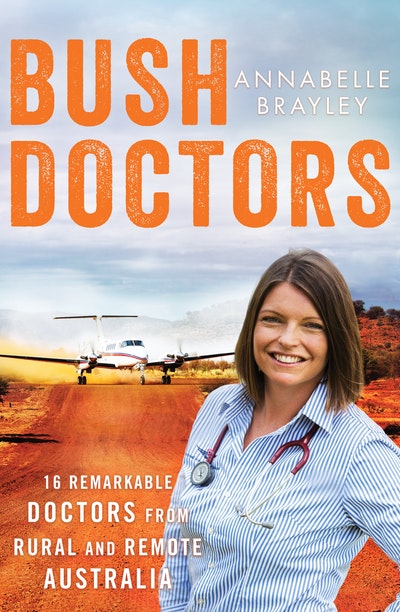- Published: 28 August 2017
- ISBN: 9780143799696
- Imprint: Michael Joseph
- Format: Trade Paperback
- Pages: 336
- RRP: $34.99
Bush Doctors
Extract
One of the reasons I chose to write about rural and remote doctors was the fact that we don’t have many, especially compared to when I first arrived at the Charleville Base Hospital in South West Queensland to finish my nursing training nearly forty years ago.
In 1978, Charleville had a population of roughly 3000 people and boasted several doctors. The remarkable Dr Louis Ariotti, world-renowned for his clever and often innovative solutions to complicated and potentially life-changing conditions or traumatic injuries, shared his private surgical practice with two highly respected general practitioners, Dr Dorothy Herbert and Dr Ron Parker.
Dr Ariotti started his practice in Charleville in 1947 and, over the course of his forty-year career in South West Queensland, performed everything from appendectomies to major orthopaedic procedures, caesarean sections to surgery for traumatic brain injury.
In May 1978, Dr Herbert had a serious accident prompting the early engagement of another of South West Queensland’s legends, Dr Chester Wilson. As his story, The BFGGP, reveals, Chester not only holds a special place in the hearts of my own family, but also in the hearts of the Charleville district as a whole because of his enormous contribution to the medical, social, musical and technological enhancement of the community.
These doctors ensured the health outcomes of everyone who chose to use private health, while those who chose the public system appreciated the excellent care provided by the doctors at the hospital. In those days, Dr Greg Wuth was the medical superintendent and there were always at least one registrar and one resident doctor on the hospital staff at any given time. Dr Ariotti provided his surgical skills to both public and private patients alike.
Dr Tim O’Leary was the fabled flying doctor of the era and the Royal Flying Doctor Service (RFDS) base at Charleville serviced the southern half of western Queensland with regular clinic runs, bringing anyone who needed more comprehensive care into Charleville for treatment. It was a rare patient who was flown out to Brisbane and, even then, probably only if Dr Ariotti was out of town.
Between them, there was nothing these doctors couldn’t handle and it was an excellent training ground for the endless parade of student and newly qualified doctors who rotated through Charleville as part of their training. Although I didn’t know it when I asked him to write the foreword to this book, the president of the Rural Doctors Association of Australia, Dr Ewen McPhee, was one of those young doctors who, as he says, ‘learnt the meaning of resilience and self-confidence’ in the busy days and nights at Charleville Hospital. Being exposed to the gamut of medical and surgical experience in this way prepared these students, residents and registrars, well, not just for rural or remote practice but, indeed, for general practice anywhere.
I began this project all fired up with some very specific opinions about the centralisation of services and speciality streaming that I believe has contributed to the demise of the multi-skilled GP who not only provided excellent medical leadership in rural and remote communities, but also social leadership. As I write this in May 2017, I’m dismayed that, since the retirement of Dr Colin Case from his practice in Augathella three months ago, we no longer have any private GPs west of Roma; none in Charleville where once we had legends. We do, of course, have doctors who rotate through the hospitals of the south west on a Queensland Health roster but retention is challenging and continuity of care an elusive concept.
Happily, I discovered that we do have some cracking doctors working in rural and remote Australia and some excellent organisations that support them and promote the inland as a viable and desirable location for doctors to live and work.
In selecting the people who feature in these stories I was, as always, trying to represent a cross-section of the doctors who fit the rural and remote category. Some of them, like Paul Duff and Brad Murphy, live and work in less isolated country towns, while others, like Anne Richards and Janelle Trees, are definitely remote.
And then there’s Kate Kloza, who removed the ruptured appendix of one of her friends on Casey Station in the Antarctic three and a half thousand kilometres south-west of Hobart.
In the words of RFDS doctor Claire Schmidt, ‘It’s a big challenge for a doctor to be in a tiny remote location, at least two hours by plane from any kind of comprehensive medical facility and facing something you may not have experienced before.’
What do you do? As Claire says, ‘You have to step up . . .’
That’s the underpinning feature I encountered with all these people; they all step up. They are clearly well-qualified, experienced doctors, but they weren’t always. They had to commit and dedicate years to learn to do what they do just so they can care for others. They’re vibrant, generous, enthusiastic, often exhausted but always resilient, and they love what they do. God knows they’d have to.
This book is intended as a tribute and celebration of all those people in Australia who fit that very special selection criteria – Bush Doctor.
Bush Doctors Annabelle Brayley
Sixteen stories of amazing outback doctors and their heroic deeds, from the bestselling author of Bush Nurses and Nurses of the Outback.
Buy now











